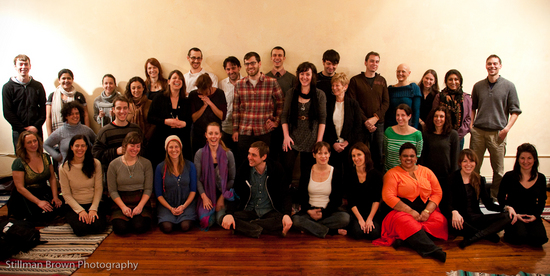Mom, Dad, (cough, sob). I have something to tell you. Share with you, really. I’ve felt terrible. I’ve been hiding something. Something big. Sneaking around. Being so… evasive. Lying, even. Dad, when you found that book in my bag, Hardcore Zen. I told you it was porn. I am so, so sorry. And mom, when you caught me sitting on that cushion, staring at the wall, and I… I told you I was stoned.
I’ve been really dishonest. I’ve been afraid to tell you something that I’ve been hiding for a long time. Because I was afraid you’d be upset.
Mom, Dad. (choke, sob)
I’m Buddhist.
Wow. That was awkward. But not that far off, for some of us. We all come to the dharma from different backgrounds, but many of us grew up in a different belief system. For some, telling our parents about our practice can be scary.
So many of us have
slouched into our practices. Maybe we started with a yoga class, read a
couple of books, and a couple of years later found ourselves chanting
gathas with a bunch of baldies. And during that time, our parents might
have suspected something was up. Maybe it was the mala beads, or the
ens? tattoo. But we don’t always want to have “the talk.”
Obviously, when we withhold from people we love, it’s because we’re
afraid of how they’ll react. And yet, while we’re withholding, there’s
always that elephant in the room. Because they know something’s up.
They don’t necessarily know what you’re doing, but the fact that you’re
hiding it makes you seem… creepy. Seriously. I know. I’ve been there.
So the question is, how do we share this thing called Buddhism?
Here’s my no-guarantee five-point system for success.
1. Mindfulness. Before you tell them, stop and examine where you’re
coming from. If you’re anything like me, you might find yourself in a
really self-righteous place about it. Oh, man, you guys are suckers for
believing in that
Judaism/Christianity/Hinduism/Jainism/Islam/Scientology/Wicca stuff. The
Buddha is waaaay better. This might have something to do with why you
haven’t told them; being so self-righteous about it, you know you’re
going to piss them off when you tell them, and you’re avoiding that
argument. Good job, but they’re not fooled. Be really careful of that
patronizing little voice in your head: oh, isn’t it sweet that you
believe in that imaginary guy in the sky. that’s so quaint! That’s what
I mean by self-righteous.
2. Mindfulness. Stop and take a look at your own beliefs, where they’re
rigid and where you’re unable to see another point of view. Maybe your
mom really believes in Jesus and it breaks her heart seeing you going
imagine why you’d reject your Jewishness in a world where you can be
Jewish and not be killed for it. Or maybe she’s just worried about you. But as long you’re convinced that your
way is the right way, you have no room to accept anyone else’s point of
view. If you can be compassionate, and truly accept where they’re
coming from, things’ll flow a lot easier.
3. Mindfulness. Take a look at how you’re making your parents wrong for
the way they observe their religion, or don’t observe their religion.
You don’t have to examine whether you’re doing it. I guarantee you, you
are. We all do. Let it go. Whatever they’re doing is whatever they’re
doing. You don’t have any right to tell them how or what to practice.
You can share what’s important to you, though, and if you’re doing it
from your heart, it’s likely they’ll accept it in some way. But like I said, no guarantees.
4. Mindfulness. Make an effort to understand what’s important to your
parents, and speak to that in a respectful way. If there are teachings
from their beliefs that you know are important to them, think about the
parallels you know from Buddhism. If you can’t find any, don’t try to invent them.
Just accept where they’re coming from. Share some of the things you’ve
learned from Buddhism that really resonate with you, and how they’ve
benefitted you. Don’t try to convince them, just share from your heart,
and keep it simple; you don’t need to pretend you’re addressing 1,250
bikkhus at Vulture Peak.
5. Mindfulness. Be willing to accept their non-acceptance of your
practice. While many of us would love our families to wholly support us
and even join us on the cushion, get that it’s not necessary for them to
approve. If they do accept it, it might not happen
in the way you expect, and it might take longer than you imagined.
Again, no guarantees. I’m just a poor suffering schmuck like you.
But I do know from experience that anytime you share with someone from
a place of I’m right and you’re wrong, it just doesn’t work. So start
sharing, and make an effort to come from a place of mindfulness, knowing that
you’re not right, they’re not wrong, and you have no idea how they’re
going to react until you start communicating with them.

